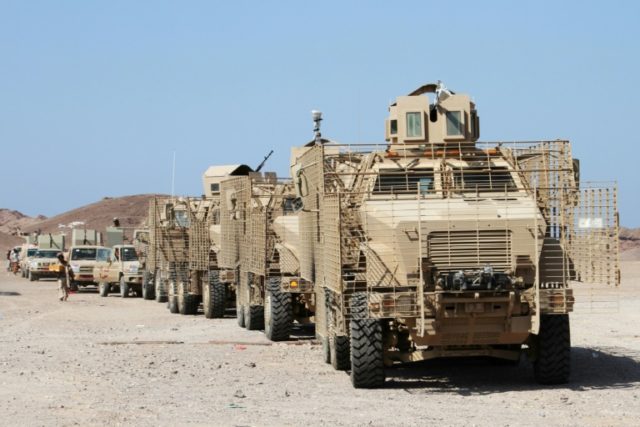Dubai (AFP) – Yemeni pro-government forces have launched a major offensive to push Shiite rebels from coastal areas, in a move analysts say aims to end a military stalemate and jumpstart political talks.
But the forces loyal to President resident Abedrabbo Mansour Hadi — who are backed by a Saudi-led military coalition — are facing divisions within their ranks that are hampering their efforts.
Supported by coalition air and sea support, loyalist forces launched operation “Golden Spear” on Saturday in Yemen’s western Dhubab district, about 30 kilometres (20 miles) north of the strategic Bab al-Mandab Strait.
The goal is to drive Huthi rebels from all of Yemen’s Red Sea coast, which stretches some 450 kilometres (280 miles).
Battles have raged since the launch of the offensive, with at least 68 fighters, including 55 rebels, killed so far, according to local military sources.
The rebels, backed by Shiite power Iran, seized control of large parts of Yemen including the capital Sanaa in 2014.
Fearing a rise in influence in its southern neighbour for regional rival Tehran, Saudi Arabia launched the intervention the following March.
But despite thousands of air strikes and the sending of coalition troops to support Hadi’s forces, the loyalists have been unable to dislodge the rebels from key positions including in Sanaa.
UN-backed peace talks have repeatedly broken down, despite the more than 7,000 people killed in the conflict and an escalating humanitarian crisis.
– ‘Change on the ground’ needed –
The latest offensive “is important to reignite the political process,” Yemen’s Foreign Minister Abdel Malek al-Mekhlafi told AFP.
“The Huthis will not accept dialogue” unless they are forced into talks by a “change on the ground,” he said.
In 2015 coalition-backed government forces managed to recapture five southern provinces, but their advance has stalled.
The rebels — and their allies of renegade troops loyal to ex-president Ali Abdullah Saleh — continue to control Sanaa, their heartland around the city of Saada and other northern provinces, and most of the southwestern Taez province.
The rebels in November established their own government in Sanaa, tasked with running areas under their control.
Hadi and his cabinet have meanwhile set up base in the southern port city of Aden, after returning from exile in Saudi Arabia.
“Both sides appear locked in a cycle of escalating violence and provocations, derailing UN peace talks,” the International Crisis Group (ICG) said in a recent report.
Seven ceasefires brokered by the United Nations have failed, while jihadists of Al-Qaeda and the Islamic State group continue to take advantage of the chaos to seize ground.
Yemeni analyst Najib Ghallab said the impasse is the result of “divisions among the rebels as well as within the legitimate government.”
Loyalist forces are drawn from a range of different groups, including regular army and police and various local militias.
“The army should be reorganised so that it receives orders from a unified leadership, not only from commanders from the Arab coalition,” Ghallab said.
Member states of the coalition, who have been training and arming units of Yemeni forces, are also recruiting them from different backgrounds.
– Political ‘sideshow’ –
The United Arab Emirates, for example, has been favouring Islamist groups to counterbalance the influence of the Al-Islah party, Yemen’s affiliate of the Muslim Brotherhood which it strongly opposes, political sources said.
Another key loyalist force is made up of southern separatists who are demanding the secession of the formerly independent south Yemen.
“All these groups agree on fighting the Huthis and the supporters of Saleh, but they disagree over the future of Yemen,” a loyalist commander said.
Mekhlafi acknowledged a “difference in approach” among various groups but said it “could be overcome the moment we achieve military progress”.
April Longley Alley, Yemen specialist at the ICG, said the new offensive could make gains.
Government forces “have a better chance on the western coast than they do in the mountains around Sanaa,” she said.
And she agreed that a change on the ground appears needed for talks.
“Political negotiations are a sideshow at the moment. The coalition appears determined to take additional territory before giving talks another chance,” she said.

COMMENTS
Please let us know if you're having issues with commenting.